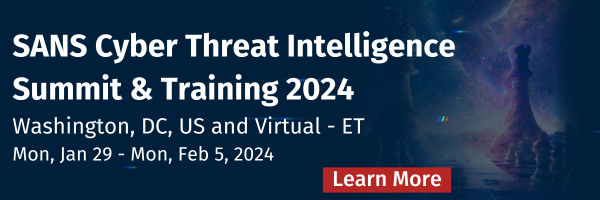SEC504: Hacker Tools, Techniques, and Incident Handling


Experience SANS training through course previews.
Learn MoreLet us help.
Contact usConnect, learn, and share with other cybersecurity professionals
Engage, challenge, and network with fellow CISOs in this exclusive community of security leaders
Become a member for instant access to our free resources.
Sign UpMission-focused cybersecurity training for government, defense, and education
Explore industry-specific programming and customized training solutions
Sponsor a SANS event or research paper
We're here to help.
Contact UsEveryone can benefit from mentorship and finding a mentor earlier in one’s career can help springboard their career journey

Blog authors: John Dolye, Selena Larson, Fletus PostonFletus Poston
“It can be hard to know where to start in the #cybersecurity field. Good news is there isn't just one way in. Listen to the 2022 New2Cyber Panel for success stories from renowned industry experts for inspiration on how to start your journey in cyber security.” -Fletus Poston, SANS Instructor Candidate BLUF:
Overview
Mentorship means different things to different people and is an area not often appreciated until a later point in one's career. Mentorship, however, is an easily accessible tool that new, junior or transitioning cyber security professionals can use to jumpstart their career.
Often, little emphasis is placed on mentorship during most organizations’ on-boarding processes and is often subjectively left to individual managers to explain, encourage, and sometimes help establish a mentor-mentee connection. The lack of organizational prioritization inadvertently understates the importance of mentorship, instead leaving individuals who seek to grow professional skills and organizational reach, spending more effort over longer time horizons to find champions to help them identify development pathways, develop growth roadmaps, and foster meaningful professional connections.
In this first blog post in our two-part mentorship series, we seek to raise awareness on the benefits of mentoring and how identifying mentors from different disciplines can help further your career ambitions. We also address common barriers to mentorship that exist – some self-imposed and some organizationally imposed. In the second blog post, will provide a list of resources and areas where individuals seeking mentorship can turn to as a starting point in their journey.
Defining Mentorship
Mentorship can be defined as the relationship between two individuals -- a mentor and a mentee -- to drive professional growth, provide insights, offer perspective diverse from one's existing frame of reference, flag opportunities, or open figurative doors through introductions. Mentors draw on their experience and professional experience and, in effect, act as a combination of a coach and cheerleader while acting as an accountability mechanism to the mentee.
Mentors can be within one's organization, inside or outside one's team, or can be an industry peer. Categorizing mentors by type can help a mentee identify potential gaps such as a peer mentor or senior leader. Having a mentor within the same job role in an organization can lend itself naturally to building skills to be successful in that current role while also identifying organizational dynamic worth knowing like career ladders, growth pathways, and what training opportunities exist. Expanding beyond the current organizational team or department provides additional perspective on other verticals the company operates in; how the roles, responsibilities, and culture vary; and potential integration points for collaboration and innovation.
Irrespective of the mentor's role, it is incumbent upon the mentee to drive the relationship. This is often one of the more misunderstood elements when one is initially introduced to the concept of mentorship. To get the most out of a mentor-mentee relationship, it will require the mentee being open, transparent, and sometimes vulnerable, addressing existing deficiencies to determine strategies and pathways to address them. The cyber security industry has no shortage of talented individuals in it that take pride in their work, which makes this sometimes a bit of a challenge because a deficiency is perceived as a weakness, though it shouldn't be. In any of the sub-disciplines in cyber security it takes years to amass the knowledge base and experience across its breadth and depth. This stigma of imposter syndrome fades the further one gets in their career and, instead is used as a form of self-awareness, allowing individuals to engage peers with complementary skills that augment their own.

Barriers to Mentorship
At its core, there are three primary factors that act as impediments to mentoring: awareness, accessibility, and approachability. Common reasons we have come across on why individuals don’t engage in mentoring corroborate this line of thought:
As practitioners, especially starting a new job, it is natural to emplace a bulk of one's focus on learning the role; its responsibilities; the technologies and systems used; team members and team operating processes. If you are lucky, there will be a team on-boarding guide that acts as a documented, knowledge capture designed to help new members integrate effectively, reducing time needed to otherwise spin up to become an active contributor.
One common barrier to mentorship is imposter syndrome. This manifests in self-doubt, uncertainty, and anxiety in one’s role and career progression despite typically being a high-performing individual. Imposter syndrome can cause negative self-talk and beliefs including someone thinking they are not deserving of mentorship or time spent with a leader in an organization. There are many ways to manage and overcome imposter syndrome, and in fact having a positive mentor/mentee relationship can be one of them. Just remember, we all started at the same place, and everyone is on their own journey of personal and professional growth and development.
Finding individuals that can serve as mentors and then approaching them tend to be the hardest part of the mentorship process. While we save the discussion on opportunities to find them for the next blog post, it is worth spending a moment on approachability.
Smart individuals, particularly those who may have very deep knowledge that you want to figure out how to grow in may sometimes appear unapproachable due to mannerisms or because they are socially obtuse. Try not to let this turn you off. John, one of the authors of the blog, has been told he is very stoic and hard to read and sometimes not the best at conveying himself in written text; however, he is quite passionate and always willing to help others how he can.
Conclusion
Mentorship is a critically important career aid designed to empower individuals looking to grow professionally, irrespective of if you are just starting your career journey or are a seasoned practitioner. Everyone can benefit from mentorship and finding a mentor earlier in one’s career can help springboard their career journey. Often having multiple mentors in different places and at different levels will provide an array of perspective to help inform your career decisions. The focus of the second blog in this will be on how to find opportunities to meet mentors with a particular eye towards those in the cyber threat intelligence field.



John has over sixteen years of experience working in Cyber Threat Intelligence, Digital Forensics, Cyber Policy, and Security Awareness and Education.
Read more about John Doyle